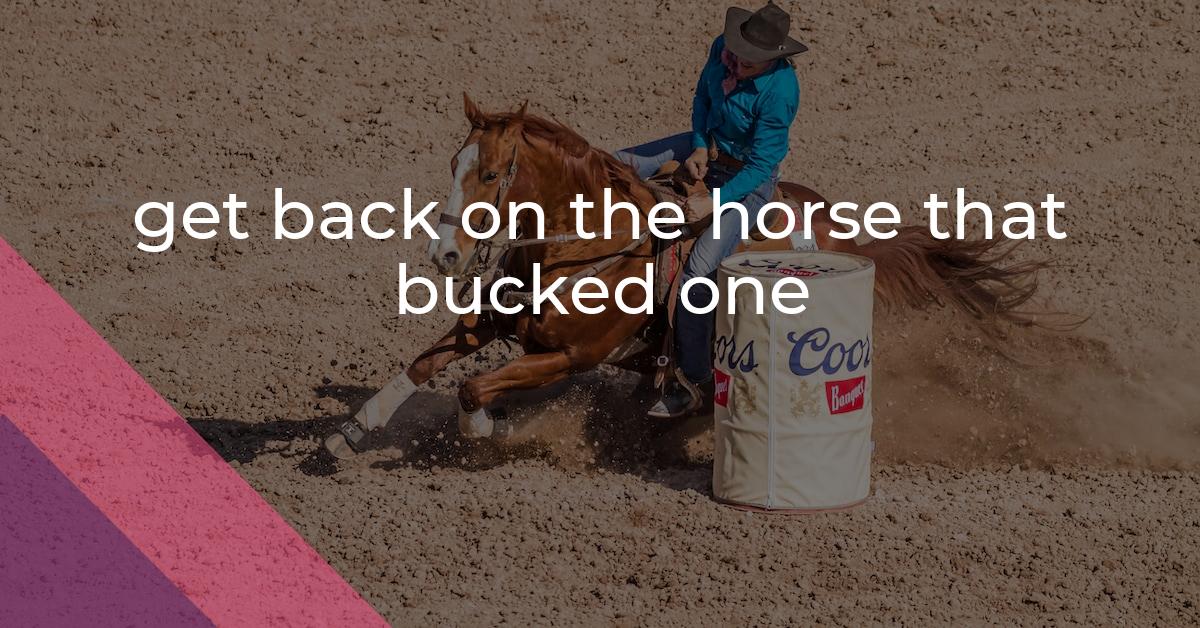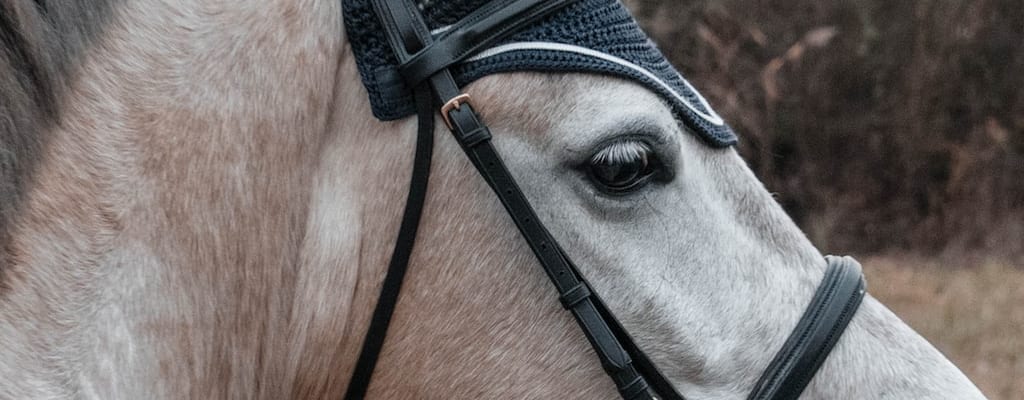get back on the horse that bucked one: Idiom Meaning and Origin
What does ‘get back on the horse that bucked one’ mean?
The idiom "get back on the horse that bucked one" means to overcome a setback or failure by taking on the same challenge again. It implies the importance of resilience and not letting past experiences discourage future endeavors.

Idiom Explorer
The idiom "land on one's feet" means to recover or be successful after a difficult or challenging situation. It suggests being able to adapt and find a positive outcome despite the circumstances.
The idiom "keep on trucking" means to persist or continue working hard despite difficulties or setbacks.
The idiom "here we go again" is used to express a feeling of frustration or annoyance when a familiar or repetitive situation occurs. It implies a sense of weariness or resignation toward something that has happened before and is likely to repeat.
The idiom "go back to the drawing board" means to start over or try a different approach because the current one has failed or is not effective.
An idiom used to describe someone or something from a person's past that unexpectedly reappears and has an impact on their present life or situation.
The idiom "get over" means to recover from or accept something traumatic or difficult. It implies moving on and finding a resolution, often referring to emotional healing or overcoming a challenge.
The idiom "get off one's high horse" means to stop behaving arrogantly or condescendingly and to become more humble or down-to-earth.
The idiom "get back at" means to seek revenge or retaliate against someone for something they have done to you.
The idiom "get oneself together" means to regain composure or emotional stability after a period of confusion, distraction, or disorganization.
Bouncing Back: Conquering the Bucking Beast
The idiom "get back on the horse that bucked one" is an expression used to convey the idea of resilience and the ability to recover from a setback or failure. It is commonly used in a figurative sense to encourage someone to return to a situation that has caused them trouble or adversity, emphasizing the importance of not allowing past failures to deter future efforts.
One possible interpretation of the idiom's origins lies in the cultural significance of horses throughout history. Horses have long been regarded as powerful and unpredictable animals, capable of sudden, jarring movements such as bucking. This physical and psychological challenge posed by horses could potentially symbolize the difficulties and obstacles one may encounter in life.
The idiom's underlying message can be seen as an extension of the age-old adage that "getting back on the horse" signifies the act of remounting a horse after being thrown off. This act demonstrates courage, determination, and a refusal to be defeated by a fall. By employing this imagery, the idiom suggests that individuals should not allow setbacks to hinder their drive to persevere and succeed. The phrase "that bucked one" further emphasizes the specific challenge or failure that prompted the need to get back on track.
While the exact origins of this idiom remain unclear, it is thought to have emerged in the English language in the late 19th or early 20th century. Its figurative usage suggests that the idiom has evolved over time to reflect broader cultural values related to resilience and the human propensity to confront and overcome obstacles.
In popular usage, the idiom is often employed in contexts where individuals are encouraged to dust themselves off and try again in the face of failure, setbacks, or challenging situations. Its widespread familiarity and resonance can be attributed to its simplicity and clarity, as well as its evocative imagery. The idiom encapsulates a universally relatable theme of perseverance, offering solace to those who have experienced disappointments, reminding them that setbacks are a natural part of life and should not deter them from their goals.
The idiomatic phrase "get back on the horse that bucked one" is closely related to the idiom "bounce back." Both expressions emphasize the importance of resilience and the ability to recover from setbacks. While "bounce back" is a more general phrase used to convey the idea of rebounding from any form of adversity, "get back on the horse that bucked one" highlights the specific challenge or failure that prompted the need to recover.
Another related idiom is "land on one's feet," which also conveys the idea of resilience and the ability to adapt and succeed despite setbacks. This idiom suggests that individuals have the capacity to navigate difficult situations and come out on top, much like a person who lands gracefully on their feet after a fall.
The idiomatic expression "buck up" is also related to "get back on the horse that bucked one" as both phrases encourage individuals to maintain a positive attitude and find the strength to persevere in the face of adversity. "Buck up" conveys the idea of summoning one's inner resolve and determination to overcome obstacles, much like getting back on the horse that has thrown you off.
The idiomatic phrase "back to square one" is similar to "get back on the horse that bucked one" as both expressions convey the sense of having to start over or return to the beginning after a setback. "Back to square one" suggests that individuals must reassess their approach and strategy, much like getting back on the horse and starting the ride anew.
Finally, the idiom "buck the trend" is also related to "get back on the horse that bucked one." "Buck the trend" refers to the act of going against commonly established patterns or norms, often in the face of adversity or opposition. Both idioms emphasize the idea of challenging the status quo and not being discouraged by obstacles or setbacks.
The idiom "get back on the horse that bucked one" and its related idioms convey a consistent theme of resilience, perseverance, and the ability to recover from setbacks. These expressions serve as powerful reminders to individuals that failure is not the end, but rather an opportunity to learn, grow, and ultimately succeed.
Example usage
Examples of how the idiom "get back on the horse that bucked one" can be used in a sentence:
- After failing the first time, she decided to get back on the horse that bucked her and try again.
- He didn't let the setback discourage him; instead, he got back on the horse that bucked him and continued pursuing his goal.
- Despite the difficulties he faced, he remained determined and got back on the horse that bucked him, refusing to give up.
The idiom signifies the act of returning to a task or situation that initially caused failure or difficulty. It conveys the idea of resilience, persevering, and not being deterred by previous failures or setbacks. By "getting back on the horse," one demonstrates a willingness to face challenges and try again.
More "Resilience" idioms



